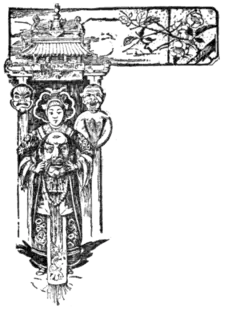
CHAPTER I.
FACE.
AT first sight nothing can be more irrational than to call that which is shared with the whole human race a "characteristic" of the Chinese. But the word "face" does not in China signify simply the front part of the head, but is literally a compound noun of multitude, with more meanings than we shall be able to describe, or perhaps to comprehend.
In order to understand, however imperfectly, what is meant by "face," we must take account of the fact that as a race the Chinese have a strongly dramatic instinct. The theatre may almost be said to be the only national amusement, and the Chinese have for theatricals a passion like that of the Englishman for athletics, or the Spaniard for bull-fights. Upon very slight provocation, any Chinese regards himself in the light of an actor in a drama. He throws himself into theatrical attitudes, performs the salaam, falls upon his knees, prostrates himself and strikes his head upon the earth, under circumstances which to an Occidental seem to make such actions superfluous, not to say ridiculous. A Chinese thinks in theatrical terms. When roused in self-defence he addresses two or three persons as if they were a multitude. He exclaims: "I say this in the presence of You, and You, and You, who are all here present." If his troubles are adjusted he speaks of himself as having "got off the stage" with credit, and if they are not adjusted he finds no way to "retire from the stage." All this, be it clearly understood, has nothing to do with realities. The question is never of facts, but always of form. If a fine speech has been delivered at the proper time and in the proper way, the requirement of the play is met. We are not to go behind the scenes, for that would spoil all the plays in the world. Properly to execute acts like these in all the complex I relations of life, is to have "face." To fail of them, to ignore them, to be thwarted in the performance of them, this is to "lose face." Once rightly apprehended, "face" will be found to be in itself a key to the combination lock of many of the most important characteristics of the Chinese.
It should be added that the principles which regulate "face" and its attainment are often wholly beyond the intellectual apprehension of the Occidental, who is constantly forgetting the theatrical element, and wandering off into the irrelevant regions of fact. To him it often seems that Chinese "face" is not unlike the South Sea Island taboo, a force of undeniable potency, but capricious, and not reducible to rule, deserving only to be abolished and replaced by common sense. At this point Chinese and Occidentals must agree to disagree, for they can never be brought to view the same things in the same light. In the adjustment of the incessant quarrels which distract every hamlet, it is necessary for the "peace-talkers" to take as careful account of the balance of "face" as European statesmen once did of the balance of power. The object in such cases is not the execution of even-handed justice, which, even if theoretically desirable, seldom occurs to an Oriental as a possibility, but such an arrangement as will distribute to all concerned "face" in due proportions. The same principle often obtains in the settlement of lawsuits, a very large percentage of which end in what may be called a drawn game.
To offer a person a handsome present is to "give him face." But if the gift be from an individual it should be accepted only in part, but should seldom or never be altogether refused. A few examples of the thirst for keeping face will suffice for illustration. To be accused of a fault is to "lose face," and the fact must be denied, no matter what the evidence, in order to save face. A tennis-ball is missed, and it is more than suspected that a coolie picked it up. He indignantly denies it, but goes to the spot where the ball disappeared, and soon finds it lying there (dropped out of his sleeve), remarking, "Here is your 'lost' ball." The waiting-woman who secreted the penknife of a guest in her master's house afterwards discovers it under the table-cloth, and ostentatiously produces it. In each case "face" is saved. The servant who has carelessly lost an article which he knows he must replace or forfeit an equivalent from his wages, remarks loftily, as he takes his dismissal, "The money for that silver spoon I do not want," and thus his "face" is intact. A man has a debt owing to him which he knows that he shall not collect; but going to the debtor, he raises a terrible disturbance, by which means he shows that he knows what ought to be done. He does not get the money, but he saves his "face," and thus secures himself from imposition in the future. A servant neglects or refuses to perform some duty. Ascertaining that his master intends to turn him off, he repeats his former offence, dismisses himself, and saves his "face."
To save one's face and lose one's life would not seem to us very attractive, but we have heard of a Chinese District Magistrate who, as a special favour, was allowed to be beheaded in his robes of office in order to save his face!